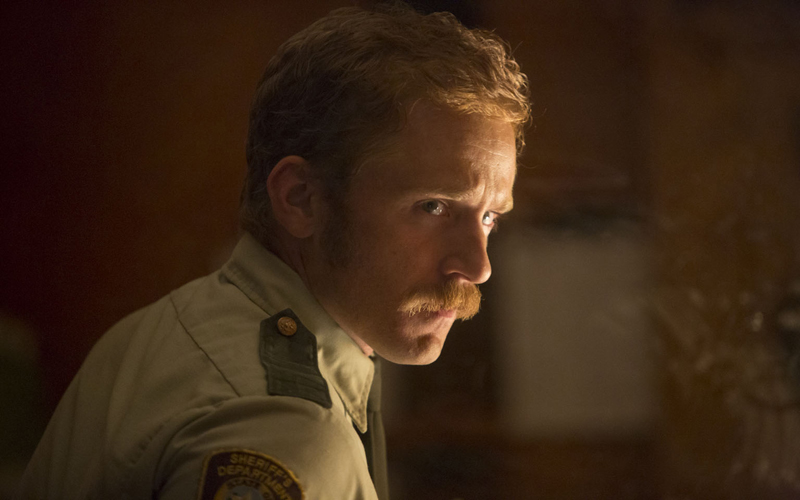The Year of Ben Foster

ABOVE: BEN FOSTER IN AIN’T THEM BODIES SAINTS. PHOTO COURTESY OF IFC FILMS.
“This is an elegant, sparse, romantic love letter to the ’70s and Texas,” says Ben Foster of his most recent film, David Lowery’s Ain’t Them Bodies Saints. “It’s rooted in Altman and Terrence Malick.”
Set in Texas in the 1970s, Ain’t Them Bodies Saints features Foster as a well-meaning police office, Patrick Wheeler, who lives in a gloomy boarding house and quietly pines after single-mother and former criminal Ruth Guthrie (Rooney Mara). Patrick’s rival for the enigmatic Ruth’s affections is the specter of her former lover and the father of her child, the incarcerated Bob Muldoon (Casey Affleck). Although Bob and Ruth may never be reunited, it is clear that any relationship between Ruth and Patrick will never match the passion or the intimacy she shares with Bob. Patrick knows this, yet persists.
Ain’t Them Bodies Saints comes out this week, the first in a series of promising films from Foster. Although the Boston-born, Iowa-raised actor has been working steadily since his first television series at age 16, 2013 seems a particularly significant year. In October, Foster will star as William Burroughs in the Beat biopic Kill Your Darlings with Daniel Radcliffe, Dean DeHaan, and Jack Huston. In December, he’ll play a navy SEAL alongside Eric Bana and Emile Hirsch in Lone Survivor. Last month, it was announced that Foster is “in talks” to play Lance Armstrong in Stephen Frears’ upcoming biopic (Foster is currently “not at liberty” to confirm his involvement).
We spoke with Foster in New York.
EMMA BROWN: Did you find David Lowery to be a particularly visual director because of his background in cinematography?
BEN FOSTER: He’s very well studied. And he’s a “do-it-yourself” kinda fella. We had the good fortune of working with Bradford Young, our cinematographer, who’s going to be one of our great cinematographers. I’d say David is more atmospheric—he’s interested in how a space feels, and I suppose that’s how it looks. But he’s interested in pursuing the space between the words. I think he’d prefer to shoot an empty doorway for three hours than shoot scenes with actors. David is tuned to music; music is very much a part of this. When I read [the script] it without speaking to David, it felt like reading an unreleased Willie Nelson record—this great old thing that got lost somewhere. Very musical. Sparse—like a country western song.
BROWN: David mentioned that the scenes between Ruth and your character Patrick were the hardest to write because there are so few of them. Did you have time before you filmed to develop a relationship with Rooney?
FOSTER: Not a whole lot. We sat down briefly. It’s about longing. I think everyone knows what that’s like—to long for someone that may not be aware of you. Everyone’s had that heartache and felt that kind of loneliness. When you’re drawn to someone, it’s exciting. So my job, really, was to try to make her smile—that was it. She’s such a great actor and when the camera rolls, she’s so alive. It’s not something you can teach people. She’s a very interesting performer. Hopefully those people have a life afterwards.
BROWN: Do you think that they do?
FOSTER: I’m a ruthless romantic, so absolutely.
BROWN: Could Ruth ever love Patrick as much as he loves her?
FOSTER: No, it’s going to be a miserable relationship of codependency. They’re just going to destroy each other with guilt and need. I think it’s very unhealthy. [laughs]
BROWN: She did shoot him…
FOSTER: The sex life can only get violent. It can only get weird after this. A lot of mustache burn.
BROWN: Do you think Patrick’s attracted to Ruth because she’s sort of a ready-made family?
FOSTER: I think that’s a good point. There’s a small detail in the picture that isn’t overly emphasized—that’s the way David works, he’s interested in underselling. Patrick Wheeler wears wedding ring, so everbody has something that they’re missing. There’s one line in the picture: “Do you have kids?” To which he says, “It didn’t work out.” What’s left unsaid suggests everybody’s lonely.
BROWN: The film was shot in a rather truncated manner— all of Casey’s scenes were shot first, and then all of Rooney’s afterwards. Did that make it difficult to visualize the film in its entirety?
FOSTER: The fortunate part is I don’t have to; I just have to cover my corner—this man. And then it’s David’s problem to deal with it.
BROWN: Do you feel responsible for the film as a whole?
FOSTER: It’s the worst part of being an actor—because you don’t have control. It’s wonderful to do all of the research and learn about something you didn’t know about, but then someone else is in control of that—that’s why I have a tendency not to watch what they do with it. I just like making movies; I don’t like watching them. I see some of them. I haven’t seen this one.
BROWN: You should. This one is good.
FOSTER: I’m just not ready to. It’s kind of like opening up love letters from a breakup—you’ve gotta be ready to read that shit. I’m not ready to read this one yet. My body will know when. I did see Lone Survivor, though, which is coming out in December, and it’s strong. It’s really strong.
BROWN: Did you ever play cops and robbers as a child?
FOSTER: Sure.
BROWN: Did you have a preference between the two sides?
FOSTER: Jailer.
BROWN: That’s slightly worrying.
FOSTER: [laughs] I think both. And then sometimes you’re, like, a wolf. Did you play those games?
BROWN: Not cops and robbers, but definitely wolves.
FOSTER: Yeah! I liked that one better.
BROWN: What sort of wolf were you?
FOSTER: It depended on the game—who else was there. You have to figure out who the alpha wolf is. Are you wolf cubs? Are you hunting?
BROWN: Are some people squirrels?
FOSTER: Some people are squirrels. This is true. And the squirrels must be eaten.
BROWN: I talked to your brother when his film Mr. Jones premiered at Tribeca. He mentioned that your mother had to leave the premiere because she was too afraid he was going to get tortured in the film.
FOSTER: Really? [laughs] I’m not surprised.
BROWN: Have you ever banned your parents from watching one of your films?
FOSTER: No, I haven’t. I’ve warned them that there are some explicit elements in certain projects, and I’ve told them not to see certain ones just because I didn’t like them. But they’re adults. If she has to leave, she has to leave. [laughs]
BROWN: I sometimes tell my parents not to buy Interview.
FOSTER: That, I understand. That’s a racy periodical you work at.
BROWN: You had a very strong Sundance year with this film and Kill Your Darlings. Do you have a favorite Burroughs story now that you’ve played him?
FOSTER: I don’t have one offhand, but just having the opportunity to read his work—it’s such a great excuse, such a great job, doing this. We get to go learn about something for six months—or three months. “My homework is reading all of William Burroughs and I have to watch everything. Boo hoo.” It’s a great gig. What a wonderful mind he had. I hadn’t read a lot [before the film]. If you’re looking not to sleep, read him. If you want some nightmares—he’s good at that.
BROWN: Did you have nightmares while you were playing him?
FOSTER: Yup. Yup. [laughs] Yup. But that’s like any job, if you spend a concentrated amount of time focusing on any subject, you’re going to dream about it.
AIN’T THEM BODIES SAINTS OPENS IN LIMITED RELEASE THIS FRIDAY, AUGUST 16. TO READ OUR INTERVIEW WITH THE DIRECTOR DAVID LOWERY, CLICK HERE.






